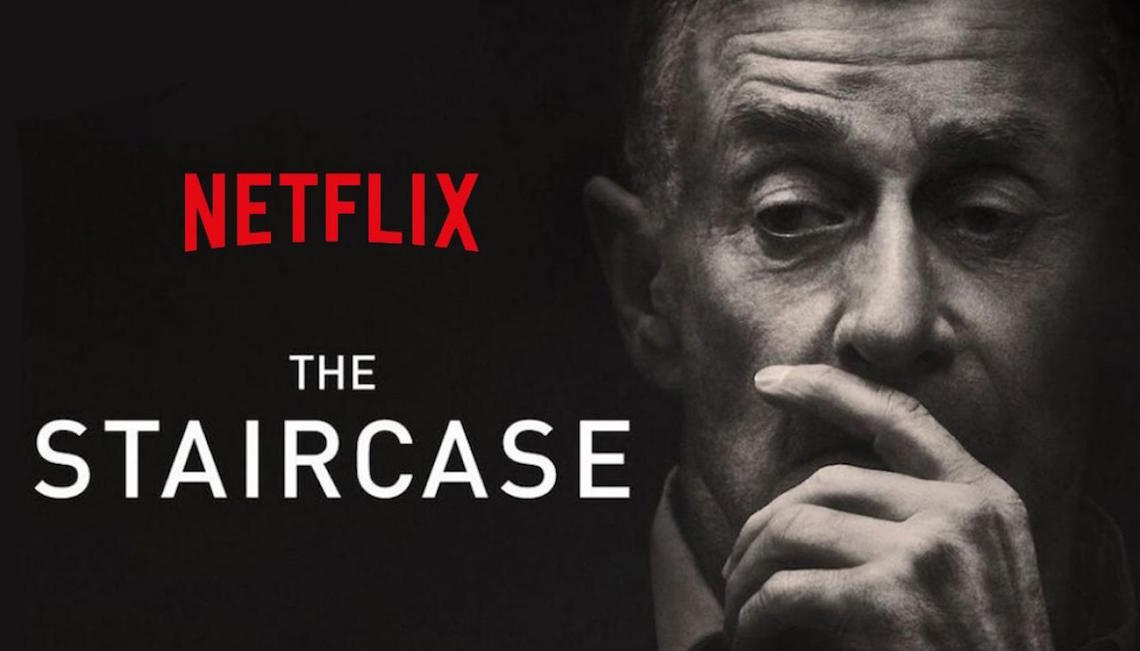Making a Murderer, Evil Genius, Casting Jon Benet, and now The Staircase – why do we love watching violent, terrible crimes unfold before our eyes while we’re safe in our living rooms?
The 2004 French miniseries has just been released across Netflix and we can’t get enough; these sixty minute glimpses into the 2001 to 2003 trial of Michael Peterson are well-paced and morbidly elegant, captivating viewers and critics alike.
In what has now become a habitual practice, we thoughtlessly switch on our televisions, make our cups of tea, cosy up on our sofas, and watch the horrific death of a woman we don’t know, the devastation of a family, and trial of a man who may or may not be guilty. We listen eagerly as each ‘new’ fact crops up; allow the dramatic Murder She Wrote-esque score to whisk us from one possibility to the next; each cinematic element is edited together perfectly for a classic cliff-hanger and fitting denouement at the end of the hour.
Much like Michael Haneke’s 2007 Funny Games, where the continuous breaks in the fourth wall mutate the audience from passive viewer to active participant in the antagonists’ grotesque violent actions, the True Crime genre doesn’t allow for inactive spectatorship. The series takes us on a journey with pit stops that explore the Peterson family’s relationships with each other, Michael Peterson’s personality, and, most importantly, the realities of the justice system. As the defence team makes facetious jokes while flicking through the available evidence, interspersed with Michael Peterson’s unwavering poetic proclamations of innocence, the audience can’t help but pass judgement. The viewer gleefully absorbs the theories of the defence and the prosecution, debating with their peers over ‘who done it’; you convince yourself that you’re not watching a true crime but rather a fiction that we’ve become so desensitised to. It’s OK to revel in the opportunity to play judge, jury, and executioner when there’s no real consequence, right?
Humans are fascinated by evil. We wonder where it comes from and whether we ourselves could ever carry out such an act […] the reader stands at the shoulder of monsters without being endangered. – Ian Rankin
Watching True Crime documentaries has become so commonplace, that it can be confused for light entertainment – sometimes, it feels like we’re playing a simple game of Cluedo, throwing perpetrators, weapons, and theories across to each other; laughing and shouting ‘ah ha!’ when we think we’ve figured it out. Could it be that, as author Ian Rankin puts it, what we’re actually enjoying is the thrill of a crime from the safe and steady pedestal of moral superiority? In episode two, Peterson’s defence team prepares him for the witness stand. They’re determined to have him ‘play the role’ he played with his deceased wife; they want to do their best to convince the jury of his compliance, grief, and innocence. However, this insider’s view into court room preparation achieves the complete opposite result with the show’s 2018 audience. We see a legal team encouraging an archetype of innocence, regardless of whether it’s deserved or not. Immediately, our BS detectors are start flashing and we begin question this man’s appeal, just as the jurors would have done, and label him as – at the very least – arrogant and emotionally disconnected. Of course, it’s easy to forget that we’re seeing only fleeting moments of a two-year trial, but we can’t deny the element of self-righteousness that creeps in as we put a glass barrier between us and the criminal.
True Crime presents a challenge that we gladly accept: where does our moral compass point? The physical separation from the crime breeds a cognitive dissonance under which we can make proclamations about how we would have done it (but of course we would never), and ‘of course he did it – look at the blood splatter! Look, he blinked!’ (knowledge based on years of consumption of Criminal Minds and CSI). Perhaps we just like seeing justice done and the bad guys being punished. In reality, it’s the gruesome details that we really fall for, hook, line, and sinker, until we’re so deep in the murky waters of manslaughter that we don’t bother questioning how we got there in the first place.
Looking at the most deviant parts of humanity is like staring into a distorted funhouse mirror; you recognise what you’re seeing, that there’s some similarity between you and the reflection, but take comfort in the fact that it is not the real you. Our fascination with ‘Otherness’ in art has been continuously examined since Beowulf; humans like to look into the abyss and see if it truly starts to look back. Knowing that we can figuratively explore the worst parts of ourselves without any last effect is tantalising (hopefully no one is using the show as a basis of what not to do).
It’s important to note that this is nothing new – Aristotle’s three unities of drama ensured that audiences experienced catharsis by emotionally connecting with the events unfolding before them. Extremes of human suffering and the darkest parts of our psyche have been explored since the days of Sophocles (Oedipus, anyone?) but the rapid influx of crime documentaries, available on any electronic device for us to watch at the drop of a hat is specific to our society. With The Staircase as the subject of four radio podcasts, six books, and twelve television adaptations, it’s clear to see that our obsession with True Crime isn’t going anywhere.
‘The Staircase: our obsession with True Crime’ is an article written by Helen Tippell. You can find Helen on LinkedIn.

